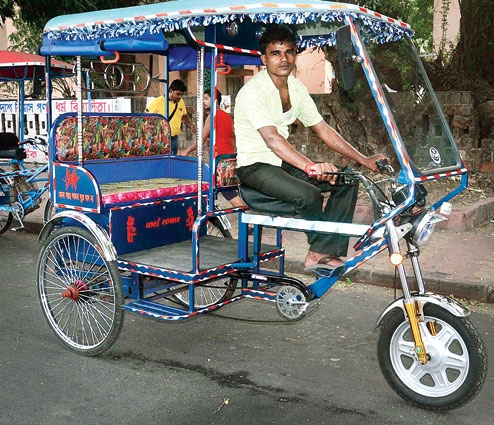
They have zero legal sanction but that has hardly kept rickshaw-pullers from rolling out one novel ride after another on the township’s streets. Battery-fitted rickshaws, featured in The Telegraph Salt Lake on February 3, are common sights now. The new version grabbing eyeballs is battery-fitted rickshaws using bike accessories.
A look at Tapan Sau’s rickshaw at Baisakhi stand raises eyebrows. It has three display screens fitted in between the handle bars. One has a speedometer and a battery charge indicator. The other flashes an arrow when the rear indicator is switched on. The third, at the middle, is a battery charge reminder, flashing a light when charge gets critically low.
There are a headlight and fog lights too. The bell is hardly the tinkle of bicycles. Above all, the rickshaw has to be switched on with an ignition key.
Tapan proudly takes this correspondent for a short ride. The arrow of the speedometer swings right as he presses the handle bar. He takes a U-turn to demonstrate how little space this takes to manoeuvre with the small tyre replacing the traditional front wheel.
There are four rickshaws that don the new look at the stand where battery-fitted rickshaws have already become the norm. Farid Gazi says the first one at the stand was delivered from the garage three weeks back. His was the second. “This has better balance than the cheaper battery-fitted rickshaws,” he says. The “cheaper” ones cost Rs 65,000. This costs Rs 5,000 to Rs 10,000 more, depending on the fittings one wants.
Sanjoy Das, in whose makeshift factory, Ma Laxmi Garage, in Barasat most of the new contraptions are fabricated, makes rickshaws with bike wheels in front. “But the ones you saw at Baisakhi stand have toto wheels in front. They are smaller and are more in demand.”
He sounds cautious when asked which makes for a safer ride. “The brakes with the bike wheels work better. A toto wheel will drag for four-five feet after applying brakes, a bike’s not so much.”
The reason why toto wheels are being preferred to bike wheels is simple. “Since there are toto manufacturers in Barasat itself, I can get new toto tyres. But for bike tyres I have to go to second hand spare parts shops in Mullickbazar. New bike tyres are not available.”


He knows there is risk of a crackdown on these battery-fitted rickshaws. “I used to make totos too. One sold for Rs 85,000. But now that licence plates have become mandatory for totos, demand has dropped. If the government bans these rickshaws, I will go back to making cycle vans.”
What about the rickshaw-pullers investing so heavily in new-age rickshaws? Nitai Das still pulls a traditional cycle rickshaw at the same stand but he has placed an order for a new one. That would cost him about Rs 65,000. He is saving up for the hefty bill. The rickshaw-pullers are unsure about the legal status of their vehicles. “Is their any legal problem?” The Telegraph Salt Lake was asked by a crowd of anxious faces when pictures were being taken of the vehicles.
The transport department does not have an answer yet except to vehemently call the hybrid structure an illegal one. “This is an issue of semi-mechanisation of a vehicle not traditionally mechanised. Cycle rickshaws fall under the purview of the municipal affairs department. Which department will deal with this is a tricky question,” said a source in the transport department, adding that the Indian jugaad menace, promising speed at low cost with least regard for safety, has already played havoc on the waterways with thousands of bhutbhutis or semi-mechanised boats ferrying passengers with impunity. “This is the first time we are hearing of such a contraption. It needs to be looked into before it becomes as rampant as vanos and totos,” he added.










